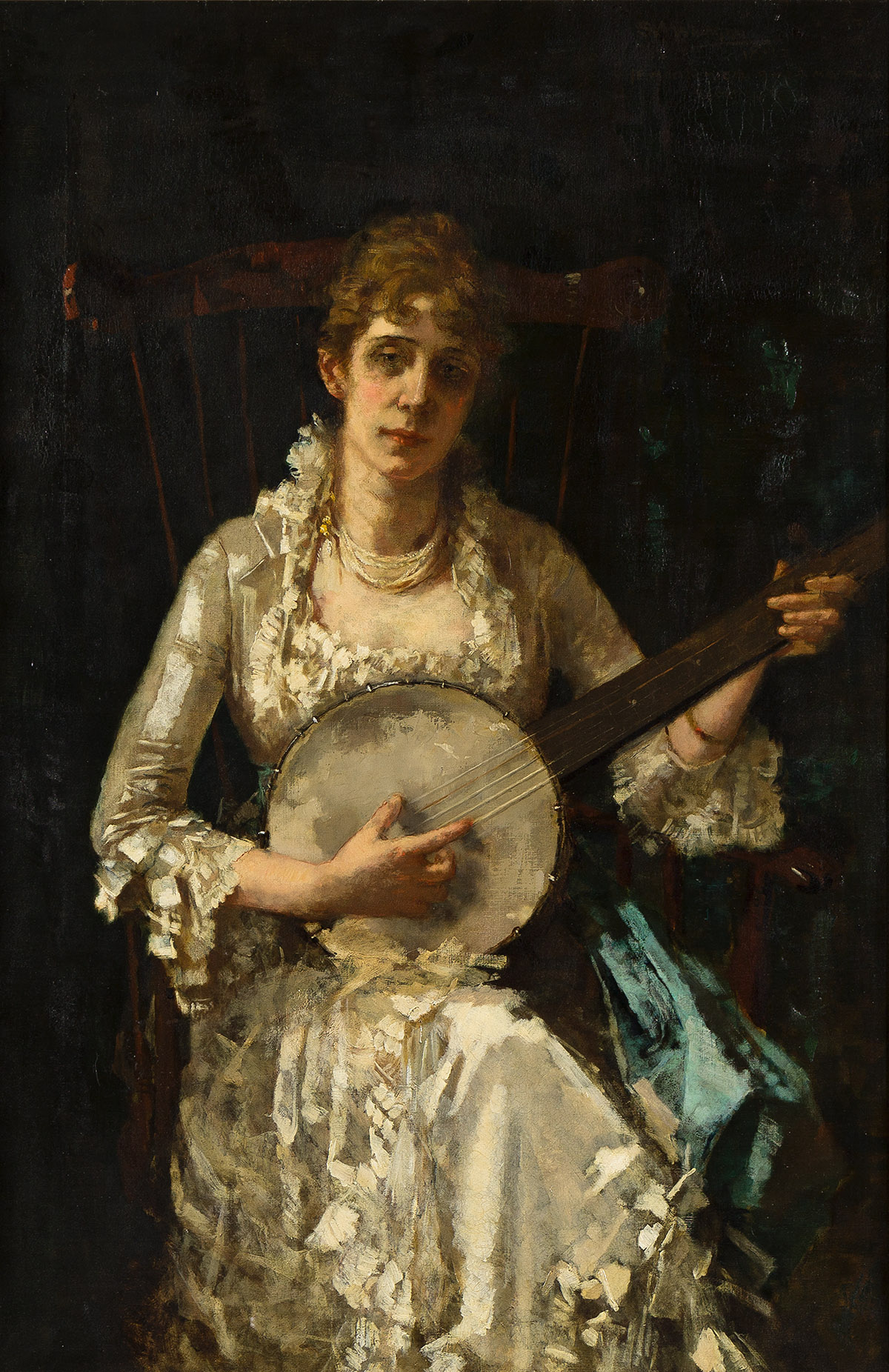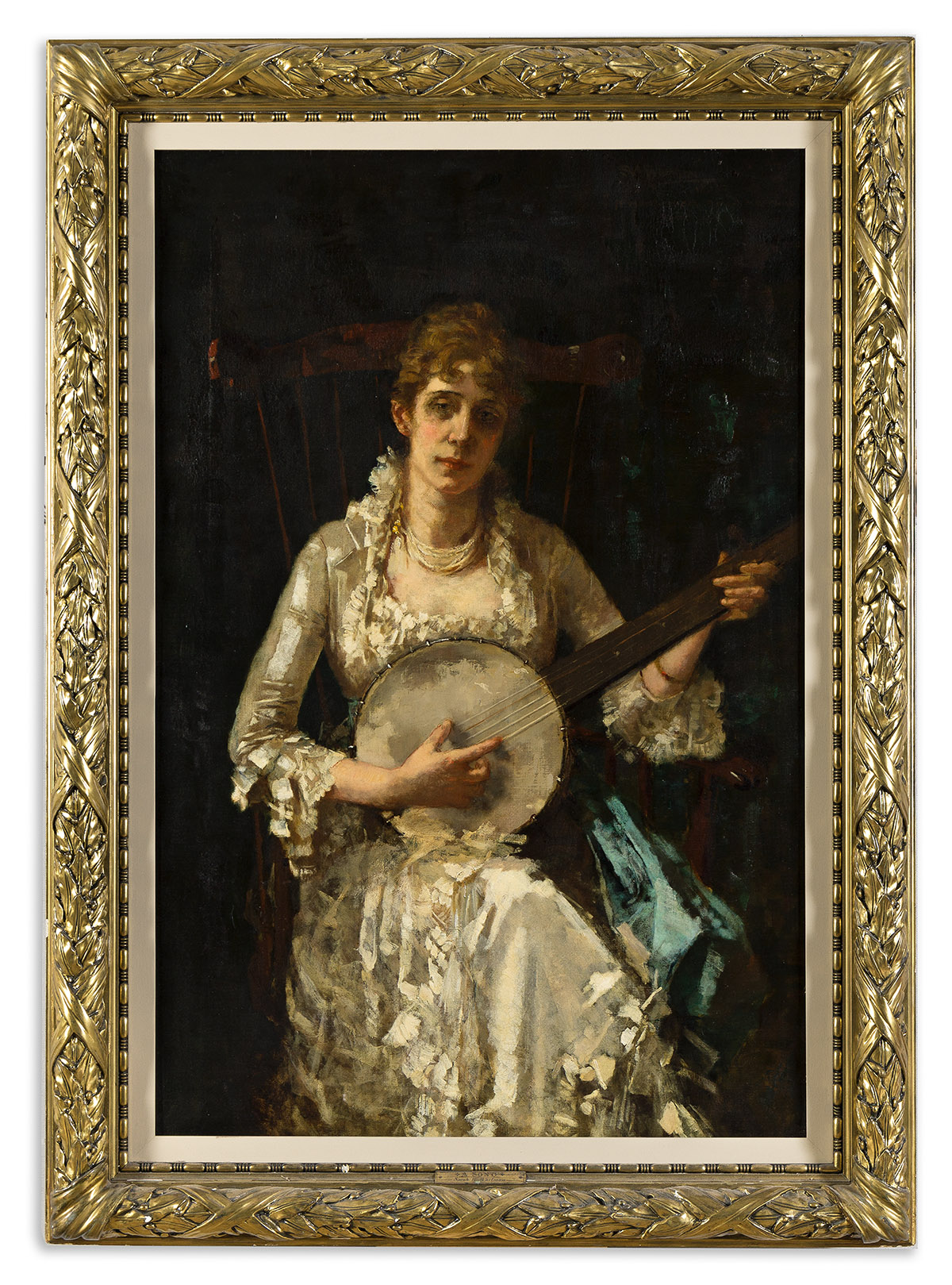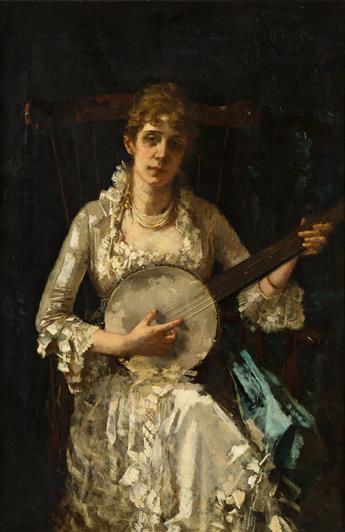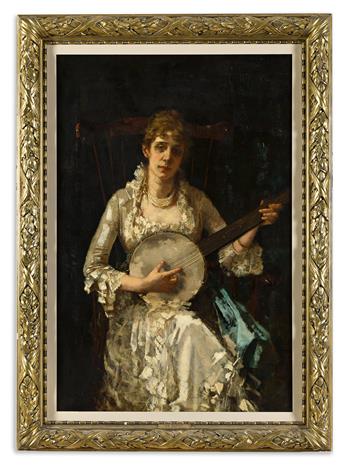Sale 2678 - Lot 12
Unsold
Estimate: $ 10,000 - $ 15,000
SARAH WYMAN WHITMAN (1842-1904)
A Song (Mabel Bayard Warren).
Oil on canvas, 1883. 1300x860 mm; 51⅛x34 inches. Signed, dated and inscribed "Je marche mieux quand ma main serre la tienne" upper right.
Provenance
The sitter, Mabel Bayard Warren (Mrs. Samuel Dennis Warren), Boston.
Loaned to the Museum of Fine Arts, Boston, April 28, 1906 to January 27, 1909.
Mrs. Warren Thayer, Lancaster, Massachusetts.
Freeman's Auctions, Philadelphia, December 5, 2004, lot 78.
Purchased from the above by current owner, Massachusetts.
Loaned to The Boston Athenaeum, September 2006-2012.
Exhibited
Massachusetts Charitable Mechanics Exhibition, 1884, number 113.
"Memorial Exhibition of Paintings by Mrs. Sarah Wyman Whitman," Museum of Fine Arts, Boston, 1906 (label).
"Picturing the Banjo," Corcoran Gallery of Art, December 10, 2005-March 5, 2006; Palmer Museum of Art of The Pennsylvania State University, University Park, Pennsylvania, March 30-June 25, 2006; Boston Athenaeum, July 26-October 21, 2006.
A Song (Mabel Bayard Warren).
Oil on canvas, 1883. 1300x860 mm; 51⅛x34 inches. Signed, dated and inscribed "Je marche mieux quand ma main serre la tienne" upper right.
Provenance
The sitter, Mabel Bayard Warren (Mrs. Samuel Dennis Warren), Boston.
Loaned to the Museum of Fine Arts, Boston, April 28, 1906 to January 27, 1909.
Mrs. Warren Thayer, Lancaster, Massachusetts.
Freeman's Auctions, Philadelphia, December 5, 2004, lot 78.
Purchased from the above by current owner, Massachusetts.
Loaned to The Boston Athenaeum, September 2006-2012.
Exhibited
Massachusetts Charitable Mechanics Exhibition, 1884, number 113.
"Memorial Exhibition of Paintings by Mrs. Sarah Wyman Whitman," Museum of Fine Arts, Boston, 1906 (label).
"Picturing the Banjo," Corcoran Gallery of Art, December 10, 2005-March 5, 2006; Palmer Museum of Art of The Pennsylvania State University, University Park, Pennsylvania, March 30-June 25, 2006; Boston Athenaeum, July 26-October 21, 2006.
Additional Details
This portrait of Mabel Bayard Warren may be one of the earliest examples of a woman depicted playing a banjo, at a time when the instrument was still confined to minstrel performers and was considered low class. The inscription taken from a poem by Alfred de Musset, translates to "I walk better when I hold your hand," and is likely a reference to Mabel Bayard's recent marriage to Samuel Dennis Warren in January 1883.
During the late 19th century, manufacturers seeking to market the banjo to a broader demographic made modifications which mellowed its sound and made it suitable for a parlor. Performers like Lotta Crabtree and Theresa Vaughn also popularized the banjo. By the 1890's the banjo was a mainstay among upper class women, like Warren (a senator's daughter), who would play at social gatherings. To adorn the north tympanum to the entrance to the Gallery of Honor in the Woman's Building at the 1893 World's Columbian Exposition in Chicago, Mary Cassatt painted a three-panel mural, now lost, entitled Modern Woman. The panels were divided into three subjects, one of which Arts, Music, and Dancing, depicts a woman playing the banjo.
Sarah Wyman Whitman was a Boston artist primarily known for her stained glass designs. She studied painting with William Morris Hunt and worked as an apprentice for John La Farge. Aside from founding her own studio, the Lily Glass Works, Whitman was the first female book designer hired by publisher Houghton Mifflin, and was one of the founders of Radcliffe College and the School of the Museum of Fine Arts in Boston. Whitman was part of a small Boston circle of women in the arts which included Isabella Stewart Gardner.
During the late 19th century, manufacturers seeking to market the banjo to a broader demographic made modifications which mellowed its sound and made it suitable for a parlor. Performers like Lotta Crabtree and Theresa Vaughn also popularized the banjo. By the 1890's the banjo was a mainstay among upper class women, like Warren (a senator's daughter), who would play at social gatherings. To adorn the north tympanum to the entrance to the Gallery of Honor in the Woman's Building at the 1893 World's Columbian Exposition in Chicago, Mary Cassatt painted a three-panel mural, now lost, entitled Modern Woman. The panels were divided into three subjects, one of which Arts, Music, and Dancing, depicts a woman playing the banjo.
Sarah Wyman Whitman was a Boston artist primarily known for her stained glass designs. She studied painting with William Morris Hunt and worked as an apprentice for John La Farge. Aside from founding her own studio, the Lily Glass Works, Whitman was the first female book designer hired by publisher Houghton Mifflin, and was one of the founders of Radcliffe College and the School of the Museum of Fine Arts in Boston. Whitman was part of a small Boston circle of women in the arts which included Isabella Stewart Gardner.
Exhibition Hours
Exhibition Hours
Aliquam vulputate ornare congue. Vestibulum maximus, libero in placerat faucibus, risus nisl molestie massa, ut maximus metus lectus vel lorem.






